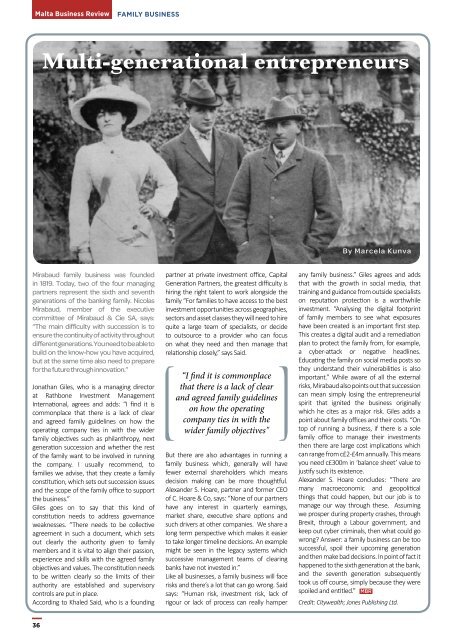Create successful ePaper yourself
Turn your PDF publications into a flip-book with our unique Google optimized e-Paper software.
Malta Business Review<br />
FAMILY BUSINESS<br />
Multi-generational entrepreneurs<br />
By Marcela Kunva<br />
Mirabaud family business was founded<br />
in 1819. Today, two of the four managing<br />
partners represent the sixth and seventh<br />
generations of the banking family. Nicolas<br />
Mirabaud, member of the executive<br />
committee of Mirabaud & Cie SA, says:<br />
“The main difficulty with succession is to<br />
ensure the continuity of activity throughout<br />
different generations. You need to be able to<br />
build on the know-how you have acquired,<br />
but at the same time also need to prepare<br />
for the future through innovation.”<br />
Jonathan Giles, who is a managing director<br />
at Rathbone Investment Management<br />
International, agrees and adds: “I find it is<br />
commonplace that there is a lack of clear<br />
and agreed family guidelines on how the<br />
operating company ties in with the wider<br />
family objectives such as philanthropy, next<br />
generation succession and whether the rest<br />
of the family want to be involved in running<br />
the company. I usually recommend, to<br />
families we advise, that they create a family<br />
constitution, which sets out succession issues<br />
and the scope of the family office to support<br />
the business.”<br />
Giles goes on to say that this kind of<br />
constitution needs to address governance<br />
weaknesses. “There needs to be collective<br />
agreement in such a document, which sets<br />
out clearly the authority given to family<br />
members and it is vital to align their passion,<br />
experience and skills with the agreed family<br />
objectives and values. The constitution needs<br />
to be written clearly so the limits of their<br />
authority are established and supervisory<br />
controls are put in place.<br />
According to Khaled Said, who is a founding<br />
partner at private investment office, Capital<br />
Generation Partners, the greatest difficulty is<br />
hiring the right talent to work alongside the<br />
family “For families to have access to the best<br />
investment opportunities across geographies,<br />
sectors and asset classes they will need to hire<br />
quite a large team of specialists, or decide<br />
to outsource to a provider who can focus<br />
on what they need and then manage that<br />
relationship closely,” says Said.<br />
“I find it is commonplace<br />
that there is a lack of clear<br />
and agreed family guidelines<br />
on how the operating<br />
company ties in with the<br />
wider family objectives"<br />
But there are also advantages in running a<br />
family business which, generally will have<br />
fewer external shareholders which means<br />
decision making can be more thoughtful.<br />
Alexander S. Hoare, partner and former CEO<br />
of C. Hoare & Co, says: “None of our partners<br />
have any interest in quarterly earnings,<br />
market share, executive share options and<br />
such drivers at other companies. We share a<br />
long term perspective which makes it easier<br />
to take longer timeline decisions. An example<br />
might be seen in the legacy systems which<br />
successive management teams of clearing<br />
banks have not invested in.”<br />
Like all businesses, a family business will face<br />
risks and there’s a lot that can go wrong. Said<br />
says: “Human risk, investment risk, lack of<br />
rigour or lack of process can really hamper<br />
any family business.” Giles agrees and adds<br />
that with the growth in social media, that<br />
training and guidance from outside specialists<br />
on reputation protection is a worthwhile<br />
investment. “Analysing the digital footprint<br />
of family members to see what exposures<br />
have been created is an important first step.<br />
This creates a digital audit and a remediation<br />
plan to protect the family from, for example,<br />
a cyber-attack or negative headlines.<br />
Educating the family on social media posts so<br />
they understand their vulnerabilities is also<br />
important.” While aware of all the external<br />
risks, Mirabaud also points out that succession<br />
can mean simply losing the entrepreneurial<br />
spirit that ignited the business originally<br />
which he cites as a major risk. Giles adds a<br />
point about family offices and their costs. “On<br />
top of running a business, if there is a sole<br />
family office to manage their investments<br />
then there are large cost implications which<br />
can range from c£2-£4m annually. This means<br />
you need c£300m in ‘balance sheet’ value to<br />
justify such its existence.<br />
Alexander S. Hoare concludes: “There are<br />
many macroeconomic and geopolitical<br />
things that could happen, but our job is to<br />
manage our way through these. Assuming<br />
we prosper during property crashes, through<br />
Brexit, through a Labour government, and<br />
keep out cyber criminals, then what could go<br />
wrong? Answer: a family business can be too<br />
successful, spoil their upcoming generation<br />
and then make bad decisions. In point of fact it<br />
happened to the sixth generation at the bank,<br />
and the seventh generation subsequently<br />
took us off course, simply because they were<br />
spoiled and entitled.” <strong>MBR</strong><br />
Credit: Citywealth; Jones Publishing Ltd.<br />
36

















